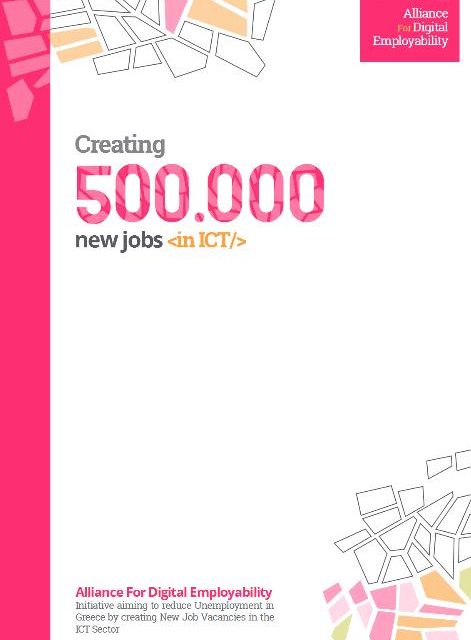A new study (“Alliance for Digital Employability: Creating 500.000 new jobs in ICT”), argues that a certain percentage of vacancies in Europe’s ICT sector could be covered by – mainly young – Greek people as part of a national strategy to develop the appropriate digital skills of young people and address the country’s high unemployment rates.
The study forms part of the “Alliance for Digital Employability” initiative that was recently launched by A. Byron Nicolaides, President of the Council of European Professional Informatics Societies (CEPIS). Byron Nicolaides created a team comprised of academics from the Athens University of Economics and Business (Diomides Spinellis, George Doukides, Katerina Pramatari, Panos Louridas) with the collaboration of the President of Hellenic Professionals Informatics Society (HePIS) Nikos Faldamis. The Alliance aims to address the pressing issue of youth unemployment, recognizing the existing dynamic of the ICT sector in Greece, which offers several investment opportunities in high-end, value added services with a global reach, leveraging the availability of skilled labour, the existing know-how and research capabilities and the strong IT and Telecoms infrastructure in the country.
Advantages of the Greek ICT sector
The ICT sector in Greece offers several opportunities of investment in high-end, value added services with a global reach, leveraging the availability of skilled labor, the existing know-how and research capabilities, the strong IT and Telecoms infrastructure and the outstanding living and working conditions. Business opportunities such as the establishment of software development labs, or microchip and MEMS design centers, data centers and R&D labs can be established with state support and staffed with highly qualified employees so as to they generate high returns in a very short time.
In this respect, the “Alliance for Digital Employability” presented its programme, with a goal to educate and infiltrate the Greek market with 500.000 new programmers by 2027. It is addressed to people with a background in sciences seeking employment and to companies interested in hiring proficient developers. The study also outlines the need to bridge the gap between supply and demand for digital skills in the Greek market and presents its vision to make Greece a magnet for internationally-orientated investments in technological development and innovation.
In fact, coding is becoming acknowledged as a critical literacy skill for the 21st century and, despite the severe implications of the financial crisis in its market, Greece has achieved in previous years important rankings worldwide in this field.
 1st Coding Boot Camp in Greece
1st Coding Boot Camp in Greece
According to the Alliance study, one of the most important aspects of the ICT market is the need for the “mobilization” of young people who are unaware of the value of and demand for digital skills, with a subsequent “induction” and “education” in their field of expertise:
The 1st Coding Boot Camp for professionals with guaranteed employment in Greece, organized by the Alliance, offered to 40 preselected candidates accelerated training in the field of programming and application development, according to the latest technologies and needs of the market. The program focused on people with background in science looking for work and on companies interested in recruiting highly qualified full-stack developers. The scope of the program was the participants to acquire all necessary skills and to be hired by leading companies as developers.
Byron Nicolaides: “Greece has the potential to become the Silicon Valley of the EU” (Part 1):














